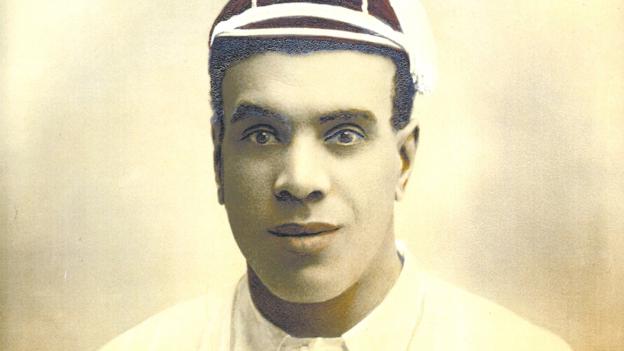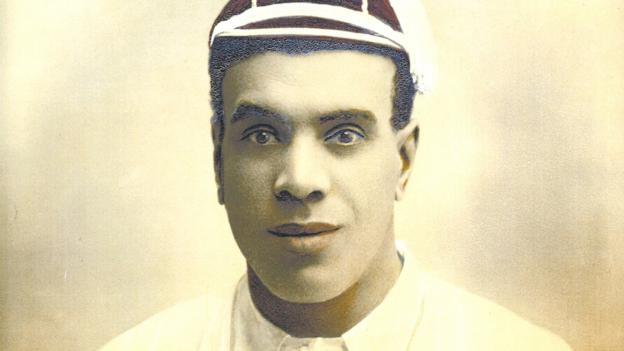Jimmy Peters: England’s first black rugby union international
The remarkable life of Jimmy Peters, England’s first black rugby player, is remembered in a BBC documentary. …


| Jimmy Peters – The first black England rugby international |
|---|
| Date: Tuesday, 24 September Time: 18:00 BST Listen via: BBC Radio Bristol and BBC Sounds |
From his father being mauled to death by a lion, to his abandonment, to representing his country and then ultimately being banned by his sport, the life of Jimmy Peters was nothing short of remarkable.
As the first black man to play rugby union for England, between 1906 and 1908, he was a pioneer.
But Peters – known as “Darkie” by followers of the game in what were less enlightened times – was hardly a trailblazer. It was 80 years before a black player would wear the red rose again.
How did the son of a Jamaican circus showman overcome tragedy, disadvantage and prejudice to became the only black player in the first 117 years of England’s international rugby union history?
From early-life tragedy to Fegan’s Orphanage
Born in Salford in 1879, the first child of a black father and a white mother, Peters’ early life saw the family moving around with a travelling zoo, but by the time his third sibling was born in 1886, his father George – a lion tamer with Cedric’s Menagerie – had been killed by a lion while performing.
Peters was then moved to another circus to entertain as a bareback rider, but was abandoned when he broke his arm in an accident and was no longer able to perform.
Left tied to a wagon, he was found and cared for by Lord and Lady Portman, who came from one of the richest families in Britain in the late 19th Century.
The Portmans sent him to Fegan’s Orphanage in London in November 1890, where boys were taught printing, carpentry, shoemaking, tailoring and – crucially – sports.
It was there that Peters would learn the game of rugby and play matches at the nearby Blackheath FC, before leaving the orphanage in September 1898.
| 2019 Rugby World Cup |
|---|
| Hosts: Japan Dates: 20 September to 2 November |
| Coverage: Full commentary on every game across BBC Radio 5 Live and Radio 5 Live Sports Extra, plus text updates on the BBC Sport website and app. |
‘The organiser, the general’ – Peters’ rugby career blossoms
Peters took a job as a carpenter back in Bristol, living in St Phillip’s Marsh, where he was reunited with his family, and he soon began playing rugby for the city’s club.
“He was quite an athletic player, with a sharp, fast pass. He was a very good ball-handler,” Bristol Rugby historian Mark Hoskins told BBC Radio Bristol.
After representing Bristol 35 times over two seasons, Peters left the city in 1902 and moved to Plymouth.
“He was a half-back so nowadays we would describe him as a fly-half or a scrum-half, but those positions hadn’t been ascribed yet,” rugby historian Tom Weir said. “He was one of the smaller players on the pitch.”
Author and historian Tony Collins added: “He was seen as the fulcrum around which the teams he played in revolved. He was the organiser, the general.”
County Championship success followed with Devon in 1906, and he made his historic England debut against Scotland soon afterwards on 17 March.
Many commentators felt his call-up should have come sooner, with the Western Times saying on 5 February that year it was a “pity” he had been overlooked for a meeting with Wales and that “colour was the difficulty” in the matter and he had been “sacrificed”.
Controversy, injury and a ban
Four more caps would follow before his final England game at Ashton Gate in Bristol in 1908, against Wales, but not before reports of racism during the visit of a touring South Africa side, who were said to be unhappy to play against a black man when they faced Devon.
Peters was dropped by the Rugby Football Union for England’s match against the tourists and not even selected among the top six half-backs for the national trials just months later.
He did eventually make two further England appearances after that tour, and carried on playing for Devon and Plymouth until he badly injured his fingers in a workplace accident.
He was subsequently given a testimonial by Plymouth, but this was seen as an act of professionalism that was against the RFU’s amateur regulations at that time, so he was banned from the sport.
Peters’ injuries would prove not to be as bad as first feared, but his ban meant he was unable to return to rugby union, so he accepted an offer from rugby league team Barrow for 18 months, before joining St Helens in 1914.
But the outbreak of World War One meant Peters could not play for Saints, as he was recalled to work in Plymouth’s naval dockyard. He would eventually marry and start a family in Plymouth, being described as a “gentleman” teetotal publican who would often quote Bible passages. He died in 1954 aged 74.
It was 80 years after Peters’ final cap before another black man played for England, when Chris Oti appeared in a 9-6 win over Scotland in 1988 (he scored a hat-trick against Ireland in his next game) – something that has been described as a “lost opportunity” for English rugby.
But with England’s 31-man squad taking part in the Rugby World Cup in Japan featuring 10 players of colour, it would seem that the prejudice faced by the man they called Darkie is an issue the English game has tackled.
Listen to the full documentary with John Inverdale on BBC Radio Bristol from 18:00 BST on Tuesday, 24 September, and for up to 30 days afterwards on BBC Sounds.
Researched and produced by BBC Radio Bristol’s Tom Ryan.




